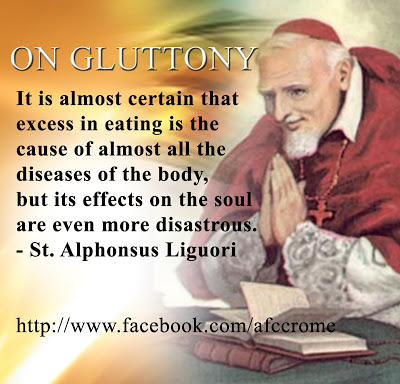February 11, 2014 Posted by tantamergo
I posted a few quotes from early desert fathers yesterday, and it was apparent from those quotes how great a danger these great ascetics saw in gluttony. Here we are speaking of traditional gluttony for food, not some other gluttony (for power, etc). A commenter rightly noted that we just don’t hear much about gluttony anymore as a grave evil. Now, those in traditional parishes might hear a good deal about the need for fasting/mortification, but that’s a bit different. While fasting should be a regular part of our faith life (for those who can do so), avoiding binge eating or other tendencies towards gluttony are just as important.
There is a good resource here for avoiding gluttony and overcoming chronic overeating. Certainly, gluttony and the attendant health problems have gone beyond epidemic proportions in the United States and most of the West. In fact, the greatest health threat to the “poor” on government assistance is not starvation, but obesity! Even young children under the age of 10 are developing coronary artery disease, type II diabetes, and other disastrous effects of being morbidly overweight.
The Church has always counseled against all sins of worldly excess, including gluttony. The basis for this counsel is, of course, Sacred Scripture, wherein there are numerous warnings against gluttony and all bodily lusts:
Proverbs 23: 20-21: Be not among winebibbers or among gluttonous eaters of meat; for the drunkard and the glutton will come to poverty, and drowsiness will clothe a man with rags.
Sirach 23:6: Let neither gluttony nor lust overcome me, and do not surrender me to a shameless soul.
Sirach 37:30-31: for overeating brings sickness, and gluttony leads to nausea. Many have died of gluttony, but he who is careful to avoid it prolongs his life.
Matthew 11:19: the Son of man came eating and drinking, and they say, `Behold, a glutton and a drunkard, a friend of tax collectors and sinners!’ Yet wisdom is justified by her deeds.
Philippians 3:18-19:For many, of whom I have often told you and now tell you even with tears, live as enemies of the cross of Christ. Their end is destruction, their god is the belly, and they glory in their shame, with minds set on earthly things.
Aquinas actually defines five ways to commit gluttony:
Laute – eating food that is too luxurious, exotic, or costly
Nimis – eating food that is excessive in quantity
Studiose – eating food that is too daintily or elaborately prepared
Praepropere – eating too soon, or at an inappropriate time
Ardenter – eating too eagerly.
Pope St. Gregory the Great proposed a list that corresponds exactly to Aquinas, as well – but 600 years earlier! So maybe the credit goes to him.
Many great Saints have provided counsel on the evils of gluttony:
“Nothing created by God is evil. It is not food that is evil but gluttony, not the begetting of children but unchastity, not material things but avarice, not esteem but self-esteem. It is only the misuse of things that is evil, not the things themselves.”
–St. Maximos the Confessor
“Devils take great delight in fullness, and drunkenness and bodily comfort. Fasting possesses great power and it works glorious things. To fast is to banquet with angels.”
– St. Athanasius the Great
“Why do demons wish to excite in us gluttony, fornication, greed, anger, rancor and other passions? So that the mind, under their weight, should be unable to pray as it ought; for when the passions of our irrational part begin to act, they prevent the mind from acting rationally.”
– St. Nilus of Sinai
‘All that we can find everywhere is selfishness, ambition, gluttony, and luxury. Is not the greater portion of men defiled by the vice of impurity, and is not Saint John right in saying, “The whole world – if something so foul may be called – “is seated in wickedness?” I am not the one who is telling you; reason obliges you to believe that out of those who are living so badly, very few are saved.’
St. Leonard of Port Maurice
‘As long as the vice of gluttony has a hold on a man, all that he has done valiantly is forfeited by him: and as long as the belly is unrestrained, all virtue comes to naught.’
Pope St. Gregory the Great
‘Love, self-restraint, contemplation and prayer accord with God’s will, while gluttony, licentiousness and things that increase them pander to the flesh. That is why “they that are in the flesh cannot conform to God’s will” (Rom. 8:8). But “they that are Christ’s have crucified the flesh together with the passions and desires.” (Gal. 5:24)’
St. Maximos the Confessor
‘I shall speak first about control of the stomach, the opposite to gluttony, and about how to fast and what and how much to eat. I shall say nothing on my own account, but only what I have received from the Holy Fathers. They have not given us only a single rule for fasting or a single standard and measure for eating, because not everyone has the same strength; age, illness or delicacy of body create differences. But they have given us all a single goal: to avoid over-eating and the filling of our bellies. . . A clear rule for self-control handed down by the Fathers is this: stop eating while still hungry and do not continue until you are satisfied.’-St. John Cassian
. . A capital vice denotes one from which, considered as final cause, i.e. as having a most desirable end, other vices originate: wherefore through desiring that end men are incited to sin in many ways. . . the vice of gluttony, being about pleasures of touch which stand foremost among other pleasures, is fittingly reckoned among the capital vices.’
St. Thomas Aquinas
‘Overeating and gluttony cause licentiousness. Avarice and self-esteem cause one to hate one’s neighbor. Self-love, the mother of vices, is the cause of all these things.’
St. Maximos the Confessor
‘The three most common forms of desire have their origin in the passion of self-love. These three forms are gluttony, self-esteem and avarice. All other impassioned thoughts follow in their wake, though they do not all follow each of them.’
St. Thalassios the Libyan
I tell you, after reading all those quotes from St. Maximos the Confessor, I am encouraged to read more about him! I don’t know a thing about him, but given the wisdom, clarity, and brevity of his counsel, I must learn more!
We enter the voluntary season of penance of Septuagesima this Sunday. This is the season where we can get our fasting and mortification down and well-established before Lent, the great penitential season, begins. It is a great gift the Church gives us, so we are really ready to go once Lent starts, so that we can truly accompany our Lord worthily on His 40 Day fast in the desert of the world.
I can tell you this blogger intends most seriously to engage in fast and much more exercise. I am becoming disturbingly Santa Claus like. I always fast half a day, but my problem has been making up a little too much for that fast time when I do eat. That, and I have 5 daughters who like to bake lots of sweets. And it would be a sin against charity to say no to your sweet 12 year old bringing you some brownie she just made, right?
I hope this is of some benefit. There are lots of other good Saint quotes on gluttony and intemperance here.















